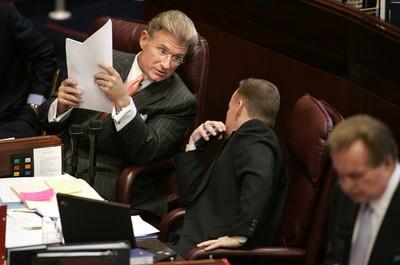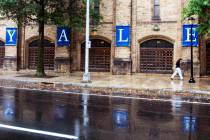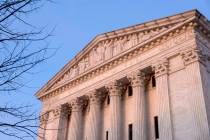Bill would shelve ‘green’ tax breaks

CARSON CITY — A tax exemption approved by lawmakers two years ago and now blamed for less-than-anticipated funding for public schools is heading for a temporary suspension by the Nevada Legislature today.
The bill temporarily suspending property and sales tax breaks for construction projects using “green” technology passed the Senate as an emergency measure Wednesday on a 19-2 vote. It is expected to be voted on today in the Assembly.
Sen. Randolph Townsend, R-Reno, said Senate Bill 567 would give lawmakers 30 days to “take a deep breath” and examine the future fiscal effects of the tax breaks.
The tax breaks, approved in Assembly Bill 3 in the 2005 special legislative session, include sales and property tax relief for building projects that meet Leadership in Energy and Environmental Design standards.
The break in the local government and schools part of the sales tax has given the Legislature heartburn this session. The tax break is thought by some lawmakers to be a partial reason why the state public schools budget might need as much as an $81 million contribution from the general fund over the coming two years to make up for the loss in local school sales taxes.
The effect of reduced revenue estimates from the property tax is not yet known.
The bailout has complicated efforts to balance the state budget and end the legislative session by June 4.
On top of the schools bailout, the state faces a reduction of $110 million in projected state general fund revenues that probably will require the elimination of some new programs included in Gov. Jim Gibbons’ 2007-09 budget.
Townsend said the temporary suspension of the green building tax breaks, which could be reauthorized by the Legislature this session, is not expected to affect any project that applied for the program and is already in the pipeline.
The biggest is a $7.4 billion City Center project in Las Vegas.
Townsend said companies planning to build under the program had to apply for the sales tax exemption during a 90-day window between Oct. 1 and Dec. 31, 2005.
“Those that have vested have a property right, and we will respect that,” he said.
“I can’t make that legal determination, but I don’t believe it will have an effect,” Townsend said.
But legislative fiscal staff are examining the long-term effects of the program, which was designed to encourage builders to use energy efficient technology to lessen energy dependence. That financial information should be available in about two weeks, Townsend said.
The property tax break of up to 50 percent for the projects can last for as long as 10 years under the 2005 bill.
“We will probably start the program up again in another 30 days, but it may be in a different form,” he said.
The suspension bill was introduced as an emergency measure and immediately voted on by the Senate and sent to the Assembly.
Townsend said during a discussion on the bill on the Senate floor that the decision to suspend the program, even if temporary, was a tough call for lawmakers.
The bill suspends the authority of the Tax Commission, the Office of Energy, the Commission on Economic Development and the Department of Taxation from adopting any regulations or accepting or processing any further applications under the program.
“The tremendous success that this previous bill had is now starting to give us some concerns,” Townsend said. “And this gives us a chance to gather numbers, look at the impacts and work with the money committees to find out exactly what those impacts have been.”
The Tax Commission had set a meeting for Monday in part to consider issues surrounding AB3 of the 2005 special session. The discussion will be delayed if SB567 passes.
Senate Minority Leader Dina Titus, D-Las Vegas, said during the floor discussion that she supported the temporary suspension but expressed concern about such emergency measures that did not follow the normal committee hearing process.
Titus also said the bill is a concern because of her long-standing efforts to fight for smarter energy consumption.
Because of the concerns, Titus said, all discussions of the ramifications of AB3 over the weeks left in the legislative session must be done in public so everyone can participate.
Sen. Bob Coffin, D-Las Vegas, was one of two lawmakers voting in opposition.
“There are economic consequences with every vote we take and every bill we pass,” he said.
When AB3 was approved, lawmakers were aware that financial consequences would occur, Coffin said.
“Decisions made by people worth billions, billions of dollars, have been made based on this legislation we have passed,” he said. “This is really a significant thing to do.”
Also voting no was Sen. Terry Care, D-Las Vegas.
A fiscal note on the original bill proposing the program said it would have only a small effect or none at all from local governments.
Clark County officials said in 2005: “Without information about the number of buildings that may be built and their costs, the estimated revenue that would be forgone is impossible to determine.”
The bill was sought by former Assemblywoman Chris Giunchigliani, D-Las Vegas, who is now a member of the Clark County Commission.
When the measure did not pass in the regular session, it was reintroduced and passed in the special session.
It was unanimously supported by those present in both the Senate and Assembly except for Senate Majority Leader Bill Raggio, R-Reno, who was recorded as not voting on the measure.
In 2005, minutes from hearings on the bill show that Giunchigliani estimated the financial effect at about $250,000.
Thirty-six for-profit developments are planning on going green in Nevada, the U.S. Green Building Council said.
Clark County has received notice from MGM Mirage and Fontainebleau about their plans to build green projects worth several billion dollars.
Without a suspension of the 2005 tax breaks, Clark County Manager Virginia Valentine said, their effect “could be huge.”
“It’s a very difficult thing for us to estimate. Depending on how much of an incentive we are offering, it could have a very serious negative impact to our revenues,” Valentine said.
The Associated Press contributed to this report.
2007Nevada Legislature
COMPANIES BENEFIT
Below is a partial list of companies that could benefit from Nevada’s “green” building tax break law, which might be suspended by state legislators:
MGM Mirage’s $7 billion City Center project in Las Vegas. Lawmakers said $80 million in sales taxes on “green” product purchases could be avoided by MGM. Whether the building materials were required to be bought in Nevada is unclear.
Patagonia in Reno qualified for a property tax break under the law. Washoe County officials said the state authorized a 10-year abatement that will amount to $80,000 a year on a 171,000-square-foot expansion of the company’s distribution center.
The state Tax Commission approved a possible tax break for a green building project by Fontainebleau Las Vegas, which is planning four projects that will cost about $1.5 billion to complete.
The commission approved possible tax breaks for the Las Vegas Sands Corp., the Molasky Corporate Center and the Echelon development proposed by Boyd Gaming Corp.
Projects not yet approved but in line for tax breaks include Wynn Encore, Palazzo Resort, Panorama Towers, World Jewelry Center and W Hotel, all in the Las Vegas area.
THE ASSOCIATED PRESS


















